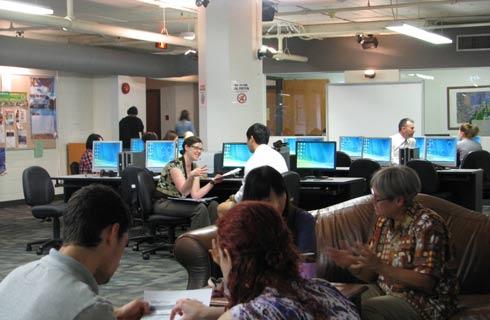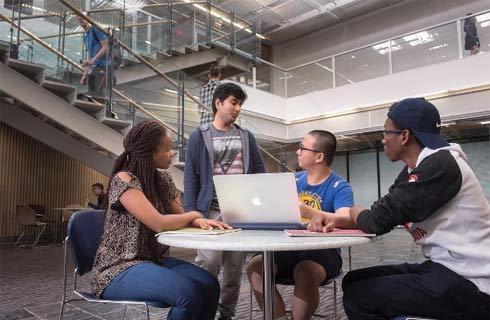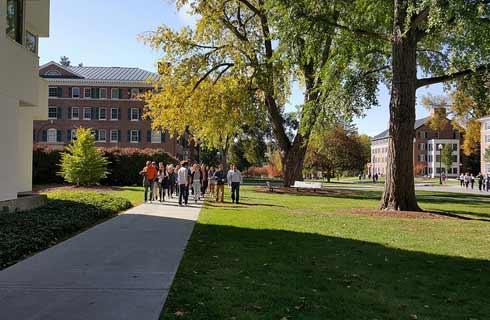- IDP China>
- 课程库>
- 工程与技术>
- 工程>
- 电机工程>
- Doctor of Philosophy in Electrical Engineering - High Performance and Configurable Computing
电气工程哲学博士-高性能和可配置计算
Doctor of Philosophy in Electrical Engineering - High Performance and Configurable Computing

学历文凭
Ph.D.

专业院系
Department of Electrical and Computer Engineering

开学时间

课程时长

课程学费

国际学生入学条件
The complete application includes
Virginia Tech Graduate School on-line application form, nonrefundable application fee $75.00.
An up-to-date, electronic copy of all official transcript(s) must be submitted with your on-line application. Please do not mail your official transcript(s) to the Graduate School until you have received an offer of admission from Virginia Tech. (Note that the ECE department does not require an official copy of your transcript(s).
Three (3) letters of recommendation.
Graduate Record Examination (GRE).
This is not required for Virginia Tech undergraduate students earning a B.S. degree in ECE at Virginia Tech with a GPA of 3.5 or higher in their last 60 hours.
TOEFL or IELTS exam for applicants earning undergraduate or graduate degrees from non-English institutions.
A Resume and a Statement of Purpose submitted with the on-line application.
For admission in Fall 2019, we expect a minimum TOEFL score of 90 (IBT) or IELTS score of 6.5 for admission. Further, TOEFL scores of 20 or greater in Listening, Writing, Speaking, and Reading subsections are required. Some departments may require higher minimum scores.
IDP—雅思考试联合主办方

雅思考试总分
6.5
- 雅思总分:6.5
- 托福网考总分:90
- 托福笔试总分:160
- 其他语言考试:NA
CRICOS代码:
申请截止日期: 请与IDP联系 以获取详细信息。
课程简介
We always demand more from our computer systems. They need to be faster, more adaptable, and more efficient. ECE researchers are using new methods to meet these demands- including letting computers dream. Intelligent beings must sleep and dream, seemingly against all survival instincts. Dreaming is necessary for efficient mental processes. The human brain uses levels of parallelism well beyond what is achievable using conventional forms of computer parallelism. ECE researchers have demonstrated how a dream-inspired phase of computation can be used to develop parallel contexts, or greatly simplified algorithmic processes tuned to specific usage scenarios, which are then selected for real-time (awake) use. Our goal of this research is to demonstrate how a novel form of scalability, and constant performance over increasing algorithmic complexity, mimics the way the brain is utilized in real-time, and enables the utilization of virtually limitless levels of parallelism.
相关申请
 预科
预科 奖学金
奖学金 实习机会
实习机会 在校学习
在校学习 跨境学习
跨境学习 校园授课-线上开始
校园授课-线上开始 在线/远程学习
在线/远程学习
开学时间&学费
学费信息仅供参考,请与IDP联系以获取详细信息
| 开学时间 | 时长 | 学费 | 地点 |
|---|
学校排名

世界排名251
数据源:
泰晤士高等教育世界大学排名
关于弗吉尼亚理工大学

弗吉尼亚理工大学是一所名列前茅、受到广泛认可的大学,开设有各种本科和硕士课程。该校在弗吉尼亚州有多个校区,拥有一支出色的教学队伍,选择入读该校的学生将获得由一流科研驱动的优质教育。弗吉尼亚理工大学开设有110多种本科和170多种研究生学位课程,有大约3.7万名学生,其中1.1万名学生在著名的工程学院学习。该校力求采用最先进的技术,在推动各门课程学习的同时寻找应对全球问题的解决方案,鼓励学生凭借自己的实力解决问题,成为领导者。该校有900多个社团和俱乐部,学生可在课余时间加入其中,其中包括YouTube和社交媒体俱乐部、学生报纸以及手工艺和咖啡俱乐部。本科生中有近20%的学生参加了男生联谊会和女生联谊会生活社区。学生在弗吉尼亚理工大学学习期间,该校强大的支持网络可为国内和国际学生提供各种服务。从住宿和财务方面的帮助,到国际学生所面临的签证和语言方面的挑战,学生都能找到所需要的帮助。弗吉尼亚理工大学非常受国际申请者的欢迎。AdvantageVT课程为希望把英语学习和课程学分结合在一起的学生提供了一个理想的途径。成功申请的学生可先学习一到三个学期,然后直接入读商务、工程或理学课程。
本校相关课程

Bachelor of Arts in Theatre Arts - Cinema
学历文凭
Bachelor Degree
开学日期
课程费用总额


Bachelor of Science in Statistics
学历文凭
Bachelor Degree
开学日期
课程费用总额


Bachelor of Arts in Spanish
学历文凭
Bachelor Degree
开学日期
课程费用总额


Bachelor of Science in Sociology
学历文凭
Bachelor Degree
开学日期
课程费用总额


Bachelor of Arts in Urban Affairs and Planning
学历文凭
Bachelor Degree
开学日期
课程费用总额


Bachelor of Science in Psychology
学历文凭
Bachelor Degree
开学日期
课程费用总额

其他相关课程

电气与计算机工程哲学博士
 滑铁卢大学
滑铁卢大学学历文凭
Ph.D.
开学日期
课程费用总额


电气工程学士学位
 多伦多都会大学
多伦多都会大学学历文凭
Bachelor Degree
开学日期
课程费用总额


电子工程技术员文凭
 尼亚加拉学院
尼亚加拉学院学历文凭
Bachelor Degree
开学日期
课程费用总额


电子工程技术高级文凭(合作社)
 尼亚加拉学院
尼亚加拉学院学历文凭
Bachelor Degree
开学日期
课程费用总额


电子工程技术员文凭
 德恒学院
德恒学院学历文凭
Bachelor Degree
开学日期
课程费用总额


电气工程技术员文凭
 德恒学院
德恒学院学历文凭
Foundation for Undergraduate
开学日期
课程费用总额










 美国
美国